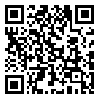BibTeX | RIS | EndNote | Medlars | ProCite | Reference Manager | RefWorks
Send citation to:
URL: http://rehabilitationj.uswr.ac.ir/article-1-1601-en.html
2- Pediatric Neurorehabilitation Research Center, University of Social Welfare and Rehabilitation Sciences, Tehran, Iran. , mpmrtajrishi@gmail.com
3- Department of Preschool Education, University of Social Welfare and Rehabilitation Sciences, Tehran, Iran.
4- Department of Biostatistics, University of Social Welfare and Rehabilitation Sciences, Tehran, Iran.
Objective The Diagnostic and Statistical Manual of Mental Disorders, fifth edition (DSM-V), has defined behavioral disorders (i.e. oppositional defiant disorder, conduct disorder, and disruptive behavior disorder) as conditions involving problems in the self-control of emotions and behaviors. The underlying causes of behavioral disorders can vary greatly across disorders and among individuals within a given diagnostic category. The behavioral disorders vary from aggression or sudden arousal to depressive actions. It contains various extreme, chronic, and deviant behaviors. Such disorders lead to individual or social problems and require educational and therapeutic intervention. Such problems in children can increase their vulnerability to psycho-social confusions in adolescence and adulthood. The present study was aimed to determine the effects of emotion management training to mothers on the behavioral problems of their boy offspring. It also measured the efficacy of the program from the parents’ perspectives.
Methods & Materials The present study was semi-experimental, having a pretest and a posttest design with a control group. An elementary masculine school was selected in convenience from the statistical population in Kermanshah City. All of the students (96 individuals) who studied at the elementary school were evaluated by the Rutter (1967) Children’s Behavior Questionnaire for parents. Thirty students who acquired high score (13 points and higher) in the questionnaire were diagnosed as having behavioral problems. An explanatory session regarding the purpose of the study was held for their mothers. The mothers were randomly assigned to an experimental and a control group in equal numbers (each group=15 individuals). The experimental group attended 9 training sessions for two months (once a week; per session lasts for 60 minutes (and received emotions management program, but the control group did not attend any such session. Again, all the students were evaluated through the Rutter Children’s Behavior Questionnaire for parents after the 9th session. Data were collected through the questionnaire before and after the training sessions. Multivariate analysis of covariance was used by SPSS (version 20) for analyzing the data.
Results The findings showed that there was a significant reduction in the scores of components of behavioral problems as follows: aggression and hyperactivity (P<0.01), anxiety and depression (P<0.002), social maladjustment (P<0.05), and antisocial behaviors (P<0.001). There was also a significant reduction in the total score of behavioral problems (P<0.001) of the offspring after mothers’ participation in emotion management training sessions. But, the score of attention shortage increased after the training sessions in the experimental group although this variation was not significant (P<0.01). It can be stated that according to Eta square, 66% of the variation in the total score of behavioral problems in offspring was due to mothers’ participation in the emotion management training program. We also found that 24%, 33%, 15%, 38%, and 11% of variations in components such as aggression and hyperactivity, anxiety and depression, social maladjustment, and antisocial behaviors, respectively, can be explained by the mothers’ participation in training sessions.
Conclusion We conclude that the training intervention (especially, emotion management training) for mothers who have male offspring with behavioral problems is beneficial not only for strengthening the parents to manage their emotions effectively but also for reducing behavioral problems in their offspring.
Received: 29/10/2016 | Accepted: 21/01/2017 | Published: 1/04/2017
| Rights and permissions | |
 |
This work is licensed under a Creative Commons Attribution-NonCommercial 4.0 International License. |






